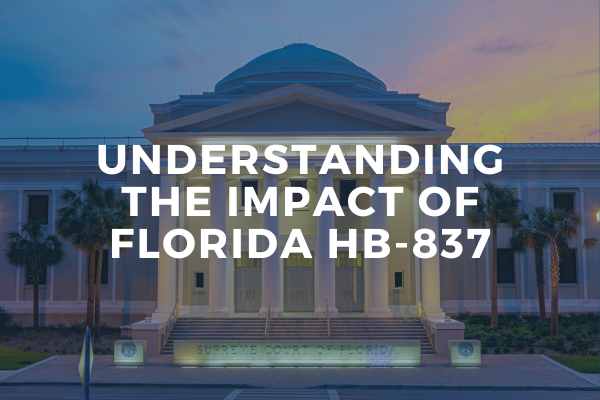Whether you’ve recently endured a personal injury or not, it’s crucial to stay informed about changes in tort legislation, because, well, accidents happen.
The Florida Tort Reform Act 2023, or HB-837, has sparked controversy due to its sweeping reforms in tort law and resulted in a surge of civil lawsuits filed prior to its implementation. However, it’s important to understand that while this legislation has the potential to impact the damages awarded, it does not eliminate the possibility of pursuing a personal injury claim. Consulting an attorney who can evaluate the specifics of your case will help you understand how this reform bill may or may not affect you.
In this article, we will highlight some of the significant changes brought about by Florida House Bill 837 (HB-837) in personal injury cases. We will delve into four main elements of the bill—comparative fault, negligent security, bad faith insurance changes, and new standards for medical bills and damages—that could potentially affect your case.
What is the Florida Tort Reform Act 2023?
The Florida Tort Reform Act 2023, also known as HB-837, is a piece of legislation aimed at reforming the state’s tort laws. Its general purpose is to address concerns regarding excessive damages awarded in certain cases, and rising insurance costs. One of the most notable changes is the reduction of Florida’s Statute of Limitations for negligence lawsuits, cutting plaintiffs’ time to file a suit in half.
How Much Time Do I Have to Bring a Lawsuit After March 2023?
The new statute of limitations gives most victims two years from the date of an injury or accident to bring a lawsuit. There are still exceptions to this rule that may further reduce the timeline. Many of our clients will work as hard as they can with an insurance company, but the reduction in the statute of limitations from four to two years provides insurance companies with the benefit of time. This change makes it all the more important to reach out to an experienced attorney as soon as possible after a crash, accident, or injury. Waiting too long to contact an attorney could potentially have negative consequences for victims, as once the statute of limitations has passed, a case cannot be filed.
Will Florida HB 837 Affect My Personal Injury Case?
HB-837 introduces substantial changes to personal injury cases in Florida, but each case is different. Here are a few changes that may be relevant:
Comparative Fault
Previously, plaintiffs could recover damages even if they were partially at fault for the accident. If they contributed in part to the accident, they could still recover damages proportionate to their fault.
Under the new law, if a plaintiff is found to be 51% or more at fault, they will be unable to recover any damages. This modified proportional negligence law will affect most personal injury cases, however one notable exception arises in medical malpractice claims.
Negligent Security and Premises Liability Cases
Before HB-837, negligent security cases involving injuries caused by third-party tortfeasors only considered the victim and the property owner. However, the reform now allows for a comparative negligence analysis. This means that the blame and liability can be shifted from a negligent property owner to an intentional wrongdoer. As a result, property owners may have reduced liability, which raises concerns that this change may discourage property owners from implementing adequate security measures. If you find yourself affected by these changes, consulting with a Vero Beach premises liability lawyer can provide the guidance you need.
Insurance and Comparative Bad Faith
Whenever it is reasonably possible, insurers have a duty of good faith to settle claims that are within policy limits.
However, HB-837 introduces comparative bad faith adjustments, which may lower the accountability of insurers to conduct good faith settlements. Insurers may now shift the focus away from their responsibilities and point to the conduct of the victim or victim’s attorney. Mistakes or omissions made by the victim during an early litigation or settlement process may now negatively affect a victim’s ability to recover. The conduct of both parties is now critical in these cases, emphasizing the need for ethical and trustworthy injury attorneys to navigate the process because victims will be held to a higher standard of conduct.
Previously, if a victim or the victim’s attorney sent a settlement offer with a 30-day deadline for the insurer to respond, if the insurer failed to respond by the deadline, the insurer could be held accountable for the full measure of damages – regardless of the policy limits.
Now, insurers have a minimum of 90 days to respond to actual notice of an injury claim, which must be accompanied by “sufficient evidence” to support the amount requested. It remains to be seen what will qualify as sufficient evidence, but this statutory provision will likely favor insurers.
Medical Bills and Damages
The reform may have significant impacts on the recovery of medical bills and damages. Specifically, HB-837 places limitations on “Letters of Protection” which are agreements made with a doctor to pay medical bills contingent on a personal injury lawsuit recovery. Additionally, HB-837 requires certain disclosures and will limit awards of medical damages to what is actually paid for. These changes may affect the willingness of doctors to treat patients who are unable to provide immediate payment.
Although victims should immediately expect a shorter statute of limitations, it may take some time for the rest of these changes to become fully implemented in the courts. These changes will undoubtedly change the personal injury landscape and are essential to consider in the event of an accident or injury.
Choose Experienced Personal Injury Attorneys in Vero Beach & The Treasure Coast
The passage of the Florida Tort Reform Act brings significant changes to personal injury cases in Florida. Even if your accident occurred a year or two ago, if it is filed after March 2023, these rules will apply to your case. Understanding the new rules and their implications is crucial if you find yourself involved in a car accident or any other personal injury. Seeking professional legal guidance will prove invaluable to ensuring the best possible outcome for your case.
At Gould Cooksey Fennell, our team of dedicated personal injury attorneys is well-equipped to guide you through the complexities of the Florida Tort Reform Act of 2023. We will work diligently to minimize any negative impacts of HB-837, ensuring that you receive the compensation and justice you deserve. Talk to someone you trust and request a free personal injury consultation with a member of our team.
Request a Free Personal Injury Consultation



